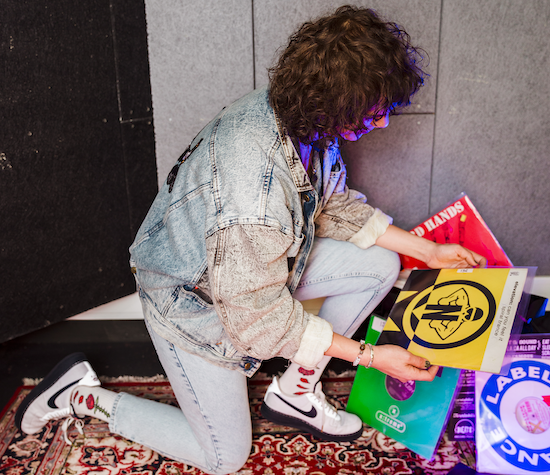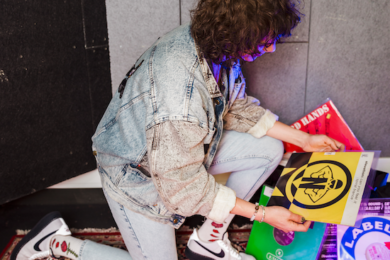"I would love to introduce my girlfriend and my favourite DJ in the world, Eris Drew!" Octo Octa, wearing a cream-coloured sweatshirt with the hood pulled up over her ears, turns to reveal Drew poised behind the decks. It’s June 2021, and the pair are live streaming a set for Boiler Room from their cabin retreat, a woodside lodge located in New Hampshire, occupied together with their partner Q and a cat named John. The camera pans across a vinyl set-up, with Drew’s scarlet-painted nails flying across the turntables, enacting her signature twists and turns, riding the pitch and performing deft scratches. The frenetic pulse of the music is juxtaposed by her backdrop; the warm orange glow of a table lamp, walls lined by bookshelves, a RUN DMC poster and a large window facing outwards onto the trees of the nearby forest.
In 2020, following the release of 2018’s Devotion EP on Naive and Transcendental Access Point on Interdimensional Transmissions earlier in 2020, Drew left her hometown of Chicago, where she’d lived for decades and built a reputation as one of the city’s best turntablists, and moved into the rural log cabin. It was here that the nine songs of her debut album, Quivering In Time, released on her joint label venture with Octo Octa, T4T LUV NRG, were composed. The record bears a striking resemblance to her mixes, with stacked layers of vinyl samples and manipulations serving as a fast-moving foundation for hand-played keyboard, walls of percussion, ricocheting vocals and strummed guitar chords.
Much like her selections, there’s also no room for filler, with each track functioning as a stand-alone accolade. Take ‘Show U LUV’ for instance. Sandwiched midway through, it stands as a homage to the disco roots of Chicago house; a peak-of-the-night, four-to-the-floor beat punctuated by a pitched-up chorus and a florid melody. The same is true of ‘Howling Wind’, a sparkling, cowbell-tinged affair adorned by synthetic flute and handclaps. Opening with a blaring siren wail, the influences behind ‘Sensation’ are more in line with the industrial-funk-techno fusion of 1980s outfit Information Society. The shuffling rhythm builds to a crux with piano riffs, before breaking down into a meandering, echo-laden snippet of cheers and laughs. It brings to mind 1990s chill-out room anthems such as Art of Noise’s ‘Moments In Love’ or The KLF’s spacey acid house experiments – weird, ambient electronica played by the likes of Mixmaster Morris for an audience of floor-ridden, tripped-out ravers.
Not one to shy away from neo-mysticism, Drew has amassed a following from party-goers who acknowledge her as the "high priestess of the Motherbeat." These references are abundant on Quivering In Time, from the shroomy LP artwork, made by Glenna Fitch (better known as Chicago DJ sold), to spiritual guru Terence McKenna’s mantra filtering through the opening bars of ‘Ride Free’. Easily the strangest moment on the album, the iconic monologue from Peter Fonda’s 1966 film The Wild Angels makes an appearance alongside a classic Think break. The result should be cliché, but instead wields a wild energy that’s entirely electrifying. McKenna’s voice – urging us to reclaim "the primacy of direct experience" with the promise that "the real universe is within your reach" – has been made about three octaves higher, giving it an amorphous, genderless quality. Meanwhile, when the drop arrives, it lands with the sound of thundering hooves and braying neighs. The surrealism makes sense given that, according to Drew, ‘Ride Free’ was inspired by a vision of horses she had on an accidental acid trip after unknowingly inhaling the drug through a mouth spray mistaken for breath fresher.
‘Baby’ congeals into a sluggish pace, undulating back and forth according to a sedated, scratched-out momentum – the kinetic prowess of Drew’s fingertips, locked into the surface of the vinyl, is felt full-force. (Anecdotally, she apparently puts so much pressure on the decks during sets that her preferred set-up entails concrete cinder blocks which can take the weight – a conjecture affirmed by this tweet advertising a T4T LUV NRG forest rave.) The centrepiece arrives, however, with the titular, final track. This is where sampling dexterity enters another universe: a funky bassline and power chords are partnered with bouncing, percussive clatter, shattering glass, robot voices, and birdsong. Think Avalon Emerson-style pop electronica meets vintage Florida breaks, meets deconstructed club, meets the bottom of the sale bin Italo disco.
It’s in these lucid shifts between genres – dissolving, looping, spiralling between BPMs and octaves – that Quivering In Time reaches its peak. Powerful, swerving transitions have long been a fixture of Drew’s sets, a style that she’s spent many years perfecting. In the late ’90s and early 2000s, while working a corporate job and training to become a lawyer, she cultivated a taste for breaks, garage and bassline, going against the mainstream penchant for tacky house and the hegemony of smooth mixing. Quivering In Time is a testament to these pivotal years, fuelled by precious memories and past experiences. Yet the album as a whole is far from nostalgic.
In her 2020 book Reverse Cowgirl, trans scholar McKenzie Wark refuses the pathologising framework of dysphoria, instead laying claim to what she describes in an interview with Bomb magazine as "a kind of gender euphoria." Through "drugs and sex on drugs," and within a trans community that "likes to drop a little Molly and go to queer techno raves in secret locations in Brooklyn and Queens," Wark characterises her experiences of dancing in the dark as existing outside presumed cis-gender normativity, producing "ecstatic effect and no more." If there’s one feeling that sits at the heart of Quivering In Time, it has to be this. The record shudders with giddy exultation, plunging into exuberant drops, joyful snatches of half-heard, or half-remembered, dancefloor exchanges. In other words, a heady, druggy mirage of unabated euphoria.



